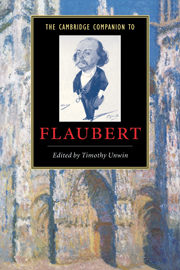Book contents
- Frontmatter
- 1 Gustave Flaubert, the hermit of Croisset
- 2 Flaubert’s place in literary history
- 3 Flaubert’s early work
- 4 Flaubert’s travel writings
- 5 Flaubert’s correspondence
- 6 History and its representation in Flaubert’s work
- 7 Death and the post mortem in Flaubert’s works
- 8 The art of characterisation in Flaubert’s fiction
- 9 The stylistic achievements of Flaubert’s fiction
- 10 The writing process
- 11 Flaubert and the visual
- 12 The theatre in the work of Flaubert
- 13 Flaubert’s failure
- 14 Flaubert, our contemporary
- Select bibliography
- Index
- Series List
1 - Gustave Flaubert, the hermit of Croisset
Published online by Cambridge University Press: 28 May 2006
- Frontmatter
- 1 Gustave Flaubert, the hermit of Croisset
- 2 Flaubert’s place in literary history
- 3 Flaubert’s early work
- 4 Flaubert’s travel writings
- 5 Flaubert’s correspondence
- 6 History and its representation in Flaubert’s work
- 7 Death and the post mortem in Flaubert’s works
- 8 The art of characterisation in Flaubert’s fiction
- 9 The stylistic achievements of Flaubert’s fiction
- 10 The writing process
- 11 Flaubert and the visual
- 12 The theatre in the work of Flaubert
- 13 Flaubert’s failure
- 14 Flaubert, our contemporary
- Select bibliography
- Index
- Series List
Summary
Famously dubbed the 'novelist's novelist' by Henry James, Flaubert has preoccupied almost every generation of writers since the mid-nineteenth century. From the seclusion of a large family home on the banks of the Seine near Rouen, the so-called hermit of Croisset raises the art of prose narrative to new levels and reveals its modernity. As he stomps up and down the avenue of lime trees in his garden, sometimes in the company of his friend and mentor Louis Bouilhet, Flaubert bellows out the sentences of Madame Bovary, to the amazement or amusement of the folk in passing river craft. This is the legendary gueuloir, or 'yelling place', where the novelist puts his writing through the test of sound, rhythm and vocal fluidity, subjecting it to the final quality control. For, as he writes to his mistress Louise Colet on 24 April 1852, 'prose was born yesterday, that is what we must tell ourselves. Verse is the quintessential form of ancient literatures. All the combinations of poetry have been tried out. But as for prose, far from it' ['la prose est née d'hier, voil à ce qu'il faut se dire. Le vers est la forme par excellence des littératures anciennes. Toutes les combinaisons prosodiques ont été; faites, mais celles de la prose, tant s'en faut' (Cor. ii 79)]. And so, as he opens up new pathways in technical and formal experiment, Flaubert also heightens awareness of the complexities and the possibilities of the novelist's craft.
- Type
- Chapter
- Information
- The Cambridge Companion to Flaubert , pp. 1 - 13Publisher: Cambridge University PressPrint publication year: 2004
- 1
- Cited by



